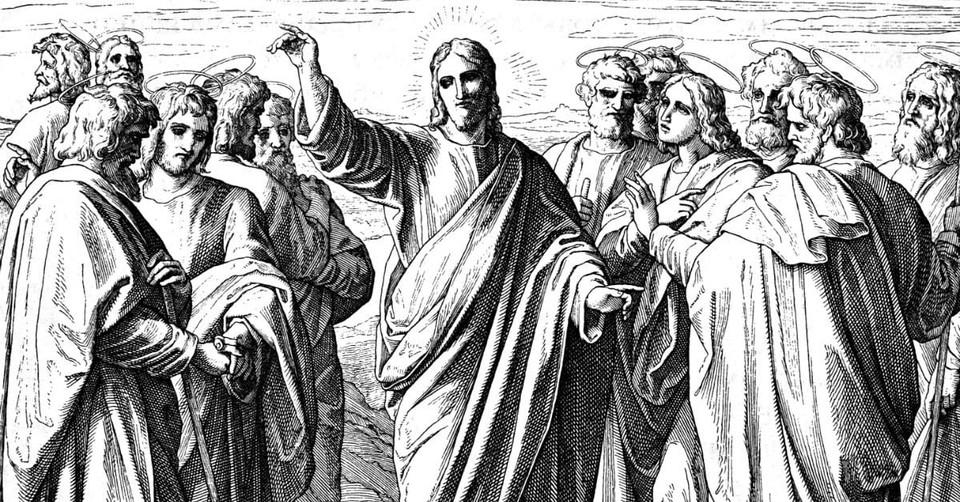7 Things the Disciples Knew about Following Jesus (That We Forget)

Two thousand years ago Jesus called four fishermen from their nets to “come follow me.” They did what fishermen don’t do: They dropped their lifelong work to follow after a man they barely knew.
In those three years, the first-ever followers of Jesus logged many miles and a lot of stumbles. They were looking for the wrong kingdom—a political kingdom. They were stumped by Jesus’ parables. They said stupid things. They wouldn’t believe that the Messiah had to suffer and die. They could hardly believe Jesus rose from his tomb. Their faith was slow and small. And yet, they did it—they “walked the same road” with Jesus before anyone else did. Even in all their bungling, these men knew some things about following Jesus that we present-day followers forget:
1. Following Jesus needn’t begin with belief.
The twelve men thought Jesus might be the Messiah, but they clearly didn’t believe it for a long while. They didn’t wait for all their questions and doubts to be answered. They knew the only way to find out was to get close, to watch and listen, to see for themselves who this man really was. Today, we often pressure seekers. We want to quickly “seal the deal” with a confession of faith. We forget that it took three years of intense relationship and, finally, Jesus’ resurrection from the dead for the twelve to know, without a doubt, that Jesus was indeed the Son of God, their Savior. We need to give lookers and seekers room and time to investigate who Jesus really is.
2. Jesus is more interested in the poor and obscure than he is in the rich and famous.
Jesus did not choose the best and brightest theology students in the synagogue for his disciples, or anyone with social status or power. Nor did he court the rich or famous. Instead he spent his time with those who were sick, unclean, despised, and invisible. In our Christian celebrity and prosperity culture, we sometimes favor and target the rich and successful, believing their influence will have a greater impact for the Kingdom than the poor. Jesus came for those who knew they were sick.
3. Following Jesus will take you out of church and “onto the road.”
When Jesus called out, “Come, follow me!” his words meant literally, “Come, walk the same road as me.” The road did include the synagogue, where Jesus often taught, but he and his disciples spent most of their time outside, on the road, wherever the people were: in villages, houses, highways, cities, gardens, deserts, and grain fields. Maybe we spend too much time trying to get people through our church doors rather than getting church people out “on the road” where people actually congregate.
4. Following Jesus turns your life upside down.
The disciples knew they were not simply adding God to their already busy lives, as we often do today. When they first began, those twelve men weren’t even sure who Jesus was, but they knew what he required and what he was worth. They gave up their jobs; they left the security of their families to pursue the Kingdom of God, a Kingdom they could not yet see, but they believed in. We may not be called to give up our jobs or leave our families in the same way, but walking with Jesus is far more than adding God as a helpful accessory to our busy lives. Following Jesus changes the entire direction and motivation of our lives.
5. Hanging around with Jesus doesn’t eliminate storms from your life.
Ask those twelve men, who knew they were going to drown in the middle of the sea, with Jesus asleep beside them. Even while Jesus was reversing death, disease, and sin, bad things still happened, including Jesus’ betrayal by one of their very own. The twelve came to learn that the road to the Kingdom of Heaven is rough, narrow, and sometimes circuitous, but Jesus unfailingly walks it with them. He is more than good company: He is the King over all of creation, over life itself.
6. Following Jesus is more than a relationship; it gives us real work to do in the world.
Jesus’ inner circle knew from the start that they had been brought into an intimate relationship with this unusual rabbi. But the Messiah was here for more than their personal well-being—and ours. From the start, Jesus made it clear he was on a mission—and they were as well. “Come, follow me, and I will make you fishers of men.” Just as he left to return to the Father, he commissioned all of us: “Go into all the world, preaching the gospel . . .” It’s easy to focus on our private relationship with our own personal Savior, but our faith is meant to go out and move and shake the world toward heaven.
7. Our small human love is enough to fulfill the huge task that Jesus has given us.
No one knew this more than Peter, who declared he’d go to the death for Jesus, then ran for his life when the soldiers came. After his resurrection, Jesus both tested and pardoned Peter with one simple question: “Do you love me?” Three times he asked. After each answer, Yeshua assigned him again: “Feed my sheep.” Jesus was asking him to found and build His church on earth. All Peter had to offer, all any of us have to offer, is our small limited human love. Yet, like the loaves and fish offered by a child, it will be enough. God’s enormous love will make our human love enough for this monumental task.

Publication date: September 30, 2016
Image courtesy: Thinkstockphotos.com
Originally published September 30, 2016.







